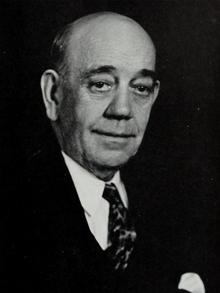
Back روبي لافوون Arabic روبى لافوون ARZ روبی لافون AZB Ruby Laffoon German Ruby Laffoon French Ruby Laffoon Italian ルビー・ラフーン Japanese Ruby Laffoon Latin Ruby Laffoon Portuguese Ruby Laffoon Swedish
Ruby Laffoon | |
|---|---|
 | |
| 43rd Governor of Kentucky | |
| In office December 8, 1931 – December 10, 1935 | |
| Lieutenant | A. B. "Happy" Chandler |
| Preceded by | Flem D. Sampson |
| Succeeded by | A. B. "Happy" Chandler |
| Personal details | |
| Born | January 15, 1869 Madisonville, Kentucky, U.S. |
| Died | March 1, 1941 (aged 72) Madisonville, Kentucky, U.S. |
| Political party | Democratic |
| Spouse |
Mary Bryant Nisbet (m. 1894) |
| Relations | Polk Laffoon (uncle) |
| Alma mater | Washington and Lee University School of Law |
| Profession | Lawyer |
Ruby Laffoon (January 15, 1869 – March 1, 1941) was an American attorney and politician who served as the 43rd Governor of Kentucky from 1931 to 1935. A Kentucky native, at age 17, Laffoon moved to Washington, D.C., to live with his uncle, U.S. Representative Polk Laffoon. He developed an interest in politics and returned to Kentucky, where he compiled a mixed record of victories and defeats in elections at the county and state levels. In 1931, he was chosen as the Democratic gubernatorial nominee by a nominating convention, not a primary, making him the only Kentucky gubernatorial candidate to be chosen by a convention after 1903. In the general election, he defeated Republican William B. Harrison by what was then the largest margin of victory in Kentucky gubernatorial history.
Dubbed "the terrible Turk from Madisonville",[1] Laffoon was confronted with the economic difficulties of the Great Depression. To raise additional revenue for the state treasury, he advocated the enactment of the state's first sales tax. This issue dominated most of his term in office and split the state Democratic Party and Laffoon's own administration. The lieutenant governor, A. B. "Happy" Chandler, led the fight against the tax in the legislature. After the tax was defeated in two regular legislative sessions and one specially called legislative session, Laffoon forged a bipartisan alliance to get the tax passed in a special session in 1934.
Laffoon's feud with Lieutenant Governor Chandler continued throughout his term and affected the 1935 gubernatorial race. (At the time, the lieutenant governor was elected independently from the governor.) Term-limited by the state constitution, Laffoon supported political boss Tom Rhea to succeed him as governor, and convinced the Democrats to again hold a nominating convention to choose their gubernatorial nominee. This would have greatly improved Laffoon's chances of hand-picking his successor. While Laffoon was on a visit to Washington, D.C., Chandler was left as acting governor under the provisions of the Kentucky Constitution. Chandler issued a call for a special legislative session to consider a mandatory primary election bill. Laffoon rushed back to the state to invalidate the call, but the Kentucky Court of Appeals upheld it as constitutional, and the primary law was passed. Chandler defeated Rhea in the primary, and went on to succeed Laffoon as governor. Following his term in office, Laffoon returned to his native Madisonville, where he died of a stroke in 1941.
Among his gubernatorial legacies was appointing a record number of Kentucky Colonels, including Harland Sanders, who would use the title "Colonel" when he opened his chain of Kentucky Fried Chicken restaurants.